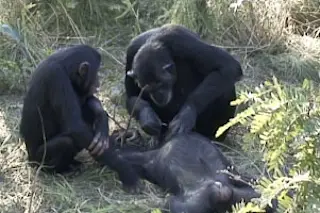After Rosie’s mother died, she accompanied the lifeless body throughout the night, in apparent mourning. When Noel lost her adopted son, she picked his teeth clean with a grass stem. And Jire carried her infant’s corpse for 68 days after the one-year-old succumbed to a respiratory infection.
Rosie, Noel and Jire are chimpanzees, whose responses to death were documented by researchers. Their behavior makes one wonder: Do chimps and other animals understand death, or are humans the only species conscious of mortality?
To completely answer this, we’d need to read animal minds. Short of that, scientists try to infer animals’ inner thoughts from their outward behaviors. Based on such observations, here’s what we know, about what chimps know, about death.
Some animals treat the corpses of community members in specific ways. For example, in social insects, like ants and termites, the dead are eaten, buried or removed from the colony, ...














